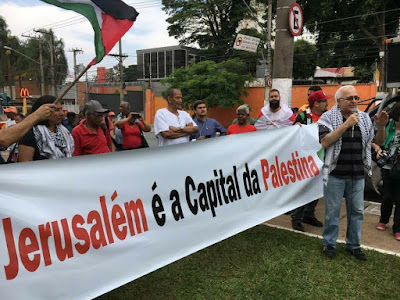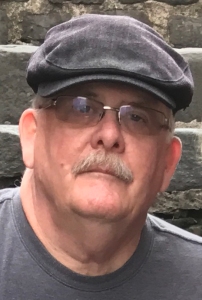 |
| Transit Workers Union President John Samuelsen is leery of the effects such a ruling could bring. (JEFFERSON SIEGEL/NEW YORK DAILY NEWS) |
 | ||
By Ginger Otis
New York Daily News
The new year will bring a new Supreme Court ruling that could have far-reaching implications for the labor movement — and many New York public-sector unions are already braced for a potentially devastating blow.
The case is Janus vs. the American Federation of State, County and Municipal Employees, and the Supreme Court is expected to hear oral arguments in mid- to late-February.
New York Daily News
The new year will bring a new Supreme Court ruling that could have far-reaching implications for the labor movement — and many New York public-sector unions are already braced for a potentially devastating blow.
The case is Janus vs. the American Federation of State, County and Municipal Employees, and the Supreme Court is expected to hear oral arguments in mid- to late-February.
AFSCME has until Jan. 12 to file briefs on the merits of its arguments in the legal battle, and labor supporters have until Jan. 19 to file their amicus briefs.
At stake is the right of public-sector unions to charge fees to workers who choose not to join labor organizations — but who still gain from the collectively bargained salaries, pensions and other benefits that unions negotiate on their behalf.
A loss in the case would overturn about 40 years of established labor law, and possibly put severe strains on the finances of public-sector unions across the country.
“We are already brainstorming on possible solutions and next steps if we lose Janus, and I believe we will,” said Peter Meringolo, former chairman of the city Correction Captains Association and now chairman of the state’s Public Employee Conference.
“If it happens, and workers who don’t join the union no longer have to pay agency fees, it’s going to be a problem,” he said.
His organization — an umbrella group that advocates for more than 65 public-sector labor organizations in New York — has already created a special committee to tackle the Janus quandary. “We are worried and we’re looking at what legislation could be passed in New York to help,” said Meringolo.
Unions have long argued — with agreement from U.S. courts — that individuals who choose not to join labor associations but who work in union shops and prosper from union-bargained contracts and benefits should pay agency fees that are akin to the dues paid by full-fledged union members.
Otherwise, the nonpayers — dubbed “free riders” or “freeloaders” — get the benefits of union actions while the financial burden is borne by others.
If the Supreme Court overturns the existing legal precedent that gives labor groups the right to charge “free riders,” the floodgates will open, labor leaders fear. Existing dues payers could choose to quit their union and keep their cash — and remain secure in the knowledge that by law, the union still has to keep collectively bargaining for them.
Meanwhile, the erosion of a dues-paying membership could cripple the public-sector labor movement, union advocates say.
District Council 37 — the city’s largest public-sector union with roughly 120,000 workers — could be among the hardest-hit, labor sources said.
“Cops, firefighters, the uniformed unions that earn the higher salaries — they’re not really feeling the pinch from paying dues,” said one longtime city union member. “But DC 37 members on a lower pay scale do feel it and likely many will opt out of paying if they can.”
On its website, DC 37 had already started sending motivational messages to its troops — touting new innovations like its Member Action Teams, volunteer organizers who do outreach to the union’s widespread network of employees, who exist across nearly every city agency.
DC 37 is a charter member of AFSCME, the national union that’s being sued by Illinois government employee Mark Janus.
Janus has argued that he doesn’t agree with AFSCME’s political positions and that he should not be forced to pay fees to support the union — even though it collectively bargains and protects Illinois state employees, including him.
Backed by numerous conservative and right-to-work groups, Janus sued the union for abridging his First Amendment rights.
Underpinning his legal challenge is a 1977 precedent set in the Abood v. Detroit Board of Eduation case.
On the merits, it’s remarkably similar to the claims made by Janus, and in 1977, the court ruled that unions could require nonmembers to help pay for collective bargaining, in part to ensure “labor peace.”
But workers don’t have to pay for unions’ political work — like doorknocking, leafletting and campaign donations — as that does violate their First Amendment rights, the Abood case said.
That ruling has stood since — but not without challenges.
Last year, the Supreme Court heard Friedrichs v. the California Teachers Association, also funded by right-wing groups and also arguing that paying union fees was a First Amendent infringement on workers who were not members.
The justices heard Friedrichs arguments in January 2016 — but the death of Justice Antonin Scalia a month later resulted in a 4-to-4 deadlock. The case reverted to the ruling of the lower court, which found in favor of the teachers’ union.
But the labor movements’ relief was short-lived, because the Janus case now looms.
Scalia’s replacement, Justice Neil Gorsuch, is a Constitutional originalist, meaning he believes the document should be construed as intended by its initial drafters.
That hasn’t given labor leaders much hope that he will side with Abood — and as Gorsuch will likely be the decisive vote, the expectation is that AFSCME will lose.
At Transport Workers Union Local 100, a union that has experienced first-hand the debilitating effect of losing dues, a plan is already afoot to counteract an unfavorable Janus ruling.
Recently, president Tony Utano rolled out his ideas at a labor talk — and put heavy emphasis on ramping up communication to existing and new members, to remind them and convince them why they need to support the union.
“Janus will mean that we will have to make still more effective use of our resources, and double down on communicating with members. We will have to represent our members as well as we ever have, even if we have less money to do it with. How we do this will take forethought, but, even more, it will take adapting to new times as we go along,” Utano said.
“The overriding point is this: This is something we can do. We can hold our ranks together ... What it takes above all is working with our members and coming through for them,” he said.
Local 100’s roughly 43,000 New York members also have an example to follow in Transport Workers of America’s national union — which has shops in two states that are already right-to-work, meaning employees there don’t have to pay fees to unions even when they benefit from union protections. Twenty-eight states in the U.S. are currently right-to-work.
“We have excellent dues density in those shops in Houston and Miami, even though they are right-to-work states,” said TWU president John Samuelsen.
“We brought the presidents in of those locals, which have about 3,000 members each, to form a national committee of public-sector unions to share information and insights,” he said.
Samuelsen is well aware of how fast a union’s fortunes can sink when the dues-paying membership disappears. In 2005, following a three-day transit strike in New York, Local 100 lost its rights to automatic dues check-off in members’ pay as a punishment for its actions.
Once paying dues become voluntary, many union members put the money in their pockets, not Local 100’s coffers.
By the time Samuelsen was elected Local 100 president in 2009, the union had lost roughly $11 million in unpaid dues, he said.
Some workers even refused to pay after the penalty was lifted and automatic dues check off was restored, he said.
To get the cash back, Samuelsen had to mount an aggressive outreach campaign to show members what their money did for them via the union — and make sure to deliver real results in contracts and job benefits.
Local 100 has made tremendous strides in getting its former scofflaws back on the books and recouping losses, said the union leader, who was elected to run TWU nationally in September.
“We run that same kind of sophisticated shop in Houston and Miami, and the members realize that their livelihoods are linked to the success of the union,” the Samuelsen said. “This situation is complicated but in some ways the answer is simple: We fight. We fight for our members and we fight with them.”
As an example, he pointed to Columbus, Ohio, where TWU is in a protracted battle to stop the automation of bus driver jobs.
“This is why the trade union movement is still so relevant — if TWU wasn’t in Columbus, those bus operators would be doomed. But we are there, and because of that those jobs will be there for the next 20 years and beyond,” he said.
If the Supreme Court rules in favor of Mark Janus, the impact will be felt fairly quickly, said labor lawyer Tim Yeung.
Because the case hinges on a constitutional challenge, if Janus wins, the ruling will supercede all other laws, he said.
“It’s the constitution, so that trumps all,” Yeung noted.
It’s not clear if public-sector unions would have to wait for immediately stop collecting them from non-members. Either way, “it’s not going to take long to affect the whole country,” Yeung noted.
In New York, public-sector unions have some measure of protection in the relatively labor-friendly state Legislature, and with Gov. Cuomo, who frequently expresses his support for union jobs.
Already, state Sen. Marisol Alcantara (D—Manhattan), chair of the Senate Labor Committee, has introduced legislation to make it easier to join a public-sector union in New York.
And state Sen. Diane Savino (D-Staten Island), a staunch labor backer, has indicated she might be willing to go even further.
“It’s premature right now to talk about specifics, but the biggest question is about duty of fair representation,” she told the Daily News. “Is it fair to force a union to represent someone who doesn’t want to be part of the union and isn’t paying any dues or fees? I think not. If you don’t want to be at the bargaining table and you want to go negotiate your own pay and benefits, go ahead and negotiate your own contract,” said Savino.
But, “others don’t necessarily see it that way,” she added.
Another question would be the right of a union to request a rebate, or a payment from a non-member union in exchange for representing them at grievances or providing other job protections, she said.
The best solution, the senator noted, is for unions to increase interactions with members and explain the benefits — not just financial — of having a strong voice in the workplace.
“Let’s hope for a good decision and be ready for a bad one,” Savino said. “But if you think this case really has anything to do with a public employee somewhere worried about First Amendment rights, I have a bridge to sell you.”








